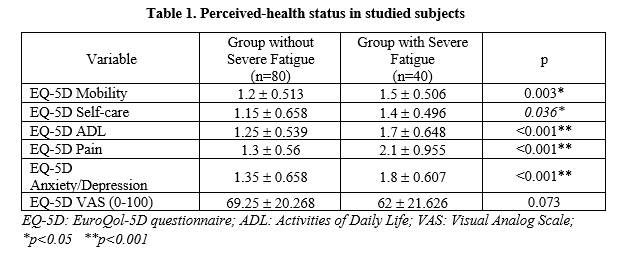Perceived-health status in lung cancer survivors presenting long-term radiotherapy-related fatigue.
Paula Blasco Valls,
Spain
PO-1251
Abstract
Perceived-health status in lung cancer survivors presenting long-term radiotherapy-related fatigue.
Authors: Paula Blasco Valls1, Verónica Cristina Hernández Uribe1, Alejandro Heredia Ciuró2, Laura López López2, María Granados Santiago3, Marie Carmen Valenza2
1Hospital Universitario Clínico San Cecilio, Radiation Oncology, Granada, Spain; 2Universidad de Granada, Physical Therapy, Granada, Spain; 3Universidad de Granada, Nursing, Granada, Spain
Show Affiliations
Hide Affiliations
Purpose or Objective
Radiotherapy-related fatigue is a
common early and chronic side-effect of irradiation, reported in up to 80 and
30% of patients during radiation therapy and at follow-up visits. Different studies
have been proved that fatigue is related to perceived-health status. However, more studies in
lung cancer are needed. The aim of this study was to evaluate the
perceived-health status of lung cancer survivor that experienced
radiotherapy-related fatigue in a long way.
Material and Methods
In this observational study, lung cancer
survivors with different stages treated with radiotherapy were included. These
patients were evaluated one year after radiotherapy treatment. They were
classified in two groups according to the fatigue levels that was evaluated by the
Fatigue Severity Scale (Severe Fatigue > 42). Perceived-health status was
evaluated by the EuroQol-5D questionnaire (EQ-5D).
Results
A
total of 120 lung cancer survivors were included in the study, of which 40 of
them referred severe fatigue. Results are presented in the following table:

Conclusion
Lung cancer survivors with a severe
radiotherapy-related fatigue referred a worse perceived-health status compared
to lung cancer survivors without a severe radiotherapy-related fatigue one year
after radiotherapy treatment.